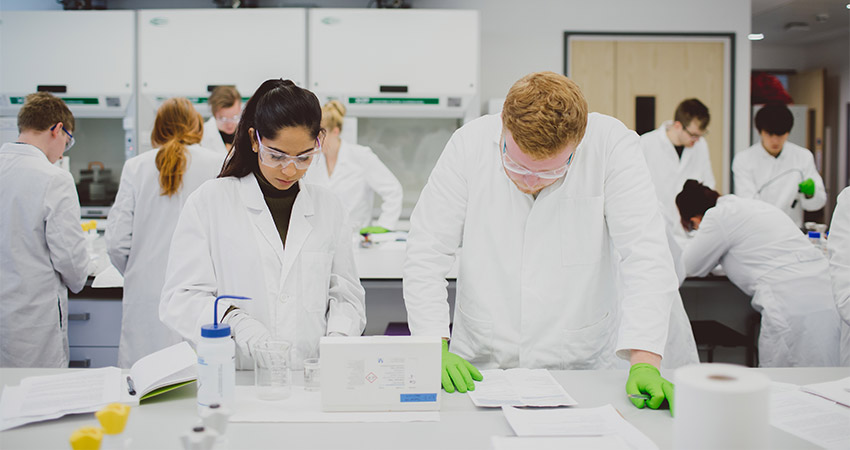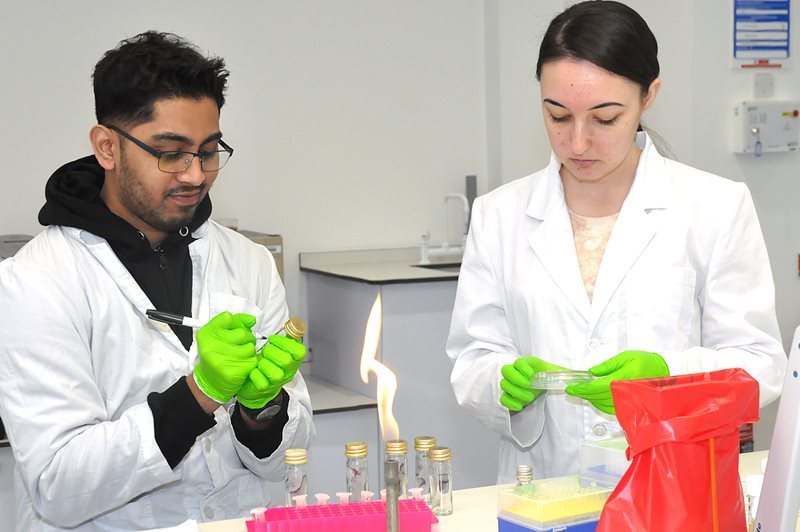UCAS code: B190
Start dates: September 2024 / September 2025
Full time: 3 years
Part time: 6 years
Location: Headington, Headington (Marston Road site)
Department(s): Department of Biological and Medical Sciences
Overview
Our BSc (Hons) Medical Science degree takes you on a fascinating exploration of the human body. If you’re curious and have a strong interest in biology and physiology, this course is for you.
You’ll study how the human body functions in heath, including aspects such as integrated physiology, neuroscience and genetics, and also in disease (pathophysiology, human genetic disease). The strong physiology aspect aligns this degree closely with many areas of disease testing, and gives you experience of laboratory work that is core to most science careers, including those with a health focus.
Through academic and practical learning, we’ll equip you with the skills employers look for, including lab techniques, data handling, computing, report writing, oral presentations, and teamwork. Our department has excellent links with industry. NHS medical scientists and clinical leads are regular guest lecturers. Students have also successfully found internships with local companies and organisations.
We’re in the business of making people’s lives better. Learn with us and have a real-world impact.

Why Oxford Brookes University?
-
Expert teaching
On your physiology and clinical modules, we often use practising Clinical Scientists and Physiologists to co-deliver your module learning, helping you build an understanding of how your growing knowledge and skills are used in professional settings.
-
Excellent grounding
The degree provides a great foundation for applying to graduate-entry Medicine and Physicians’s Associate courses. It builds on core medical science subjects.
-
Future roles
Many graduates are appointed to research posts in universities, research institutes, or biotechnology companies each year.
-
Strong industry links
Our links with industry mean many students go on to work for local hospitals and research institutions. We also regularly welcome guest lecturers from industry.
-
Research experience
You’ll work with our academics in research groups. You’ll delve into pertinent subjects such as genetic damage induced by radiation and how the heart and lungs function.
-
Free language courses
Free language courses are available to full-time undergraduate and postgraduate students on many of our courses, and can be taken as a credit on some courses.
-
Study abroad
You may be able to go on a European or international study exchange while you are at Brookes. Most exchanges take place in the second year. Although we will help as much as we can with your plans, ultimately you are responsible for organising and funding this study abroad.
Course details
Study modules
Teaching for this course takes place Face to Face and you can expect around 11 hours of contact time per week.In addition to this, you should also anticipate a workload of 1,200 hours per year. Teaching usually takes place Monday to Friday, between 9.00am and 6.00pm.
Contact hours involve activities such as lectures, seminars, practicals, assessments, and academic advising sessions. These hours differ by year of study and typically increase significantly during placements or other types of work-based learning.
Please note: As our courses are reviewed regularly as part of our quality assurance framework, the modules you can choose from may vary from those shown here. The structure of the course may also mean some modules are not available to you.
Careers
You’ll be fully prepared for a career at the cutting edge of medical science. Alongside training you in theory and practice, we blend career development guidance and support into our modules, and these activities will help to prepare you for the world of professional work.
Many of our graduates have gone on to work in bioscience companies, diagnostic labs, diagnostic clinics, or to study further either through an MSc or a research-focused PhD studentship. While you’re with us, we’ll arm you with the skills you need to be successful in the workplace.
Oxford provides many excellent work opportunities. We have organisations like, Abbott Diabetes Care, Oxford Biomedica, Oxford Science Park, Milton Park and Abingdon Science Park right on our doorstep. Popular roles include:
- physician associate
- biochemist
- biotechnologist
- medical research scientist
- lab technician
- forensic scientist
- clinical research associate.
The BSc degree is well designed to provide a foundation for graduate-entry medical school or further academic training in the life and medical sciences.
Related courses
Entry requirements
Wherever possible we make our conditional offers using the UCAS Tariff. The combination of A-level grades listed here would be just one way of achieving the UCAS Tariff points for this course.
Standard offer
UCAS Tariff Points: 104
A Level: BCC
IB Points: 29
BTEC: DMM
Contextual offer
UCAS Tariff Points: 88
A Level: CCD
IB Points: 27
BTEC: MMM
Specific entry requirements
A Level: Including one A Level or a comparable Level 3 qualification in a science subject (e.g. Biology, Chemistry, Maths, Physics, PE).
If you do not have a background in science, we encourage you to consider our Life Sciences Foundation year. Successful completion of this enables students to progress on to the BSc Medical Science (and a range of undergraduate degrees in the faculty - see website for more details).
Please also see the University's general entry requirements.
English language requirements
Please see the University's standard English language requirements.
Pathways courses for international and EU students
If you do not meet the entry requirements for this degree, or if you would like more preparation before you start, you can take an international foundation course. Once you enrol, you will have a guaranteed pathway to this degree if you pass your foundation course with the required grades.
If you only need to meet the language requirements, you can take our pre-sessional English course. You will develop key language and study skills for academic success and you will not need to take an external language test to progress to your degree.
English requirements for visas
If you need a student visa to enter the UK you will need to meet the UK Visas and Immigration minimum language requirements as well as the University's requirements. Find out more about English language requirements.
Credit transfer
Many of our courses consider applications for entry part-way through the course for students who have credit from previous learning or relevant professional experience.
Find out more about transferring to Brookes. If you'd like to talk through your options, please contact our Admissions team.
Terms and Conditions of Enrolment
When you accept our offer, you agree to the Terms and Conditions of Enrolment. You should therefore read those conditions before accepting the offer.
International qualifications and equivalences
How to apply
Application process
Full time international applicants can also apply through UCAS
Tuition fees
Questions about fees?
Contact Student Finance on:
Tuition fees
Please note, tuition fees for Home students may increase in subsequent years both for new and continuing students in line with an inflationary amount determined by government. Oxford Brookes University intends to maintain its fees for new and returning Home students at the maximum permitted level.
Tuition fees for International students may increase in subsequent years both for new and continuing students.
The following factors will be taken into account by the University when it is setting the annual fees: inflationary measures such as the retail price indices, projected increases in University costs, changes in the level of funding received from Government sources, admissions statistics and access considerations including the availability of student support.
How and when to pay
Tuition fee instalments for the semester are due by the Monday of week 1 of each semester. Students are not liable for full fees for that semester if they leave before week 4. If the leaving date is after week 4, full fees for the semester are payable.
- For information on payment methods please see our Make a Payment page.
- For information about refunds please visit our Refund policy page
Financial support and scholarships
Additional costs
Please be aware that some courses will involve some additional costs that are not covered by your fees. Specific additional costs for this course are detailed below.
You will need basic personal protection equipment for your laboratory practical classes. A lab coat costs around £27 and safety glasses can usually be bought for a few pounds.
Information from Discover Uni
Full-time study
Part-time study
Programme changes:
On rare occasions we may need to make changes to our course programmes after they have been
published on the website. For more information, please visit our
changes to programmes page.

